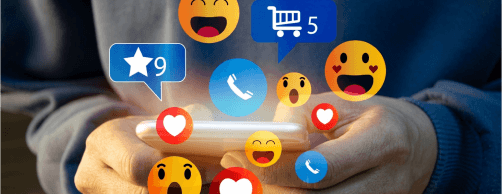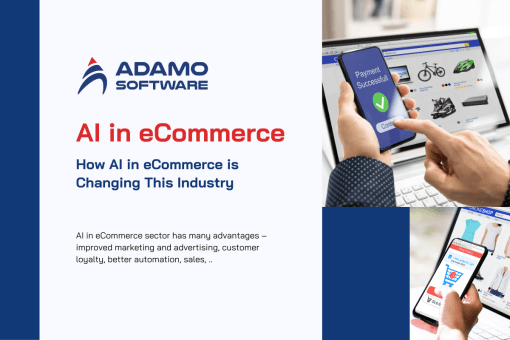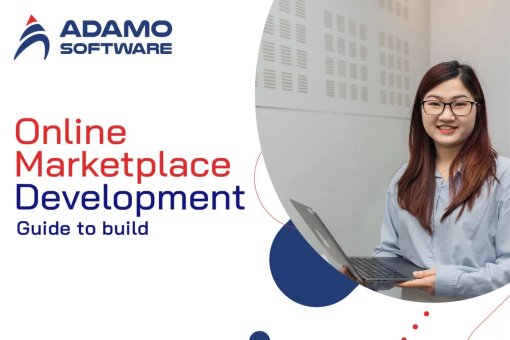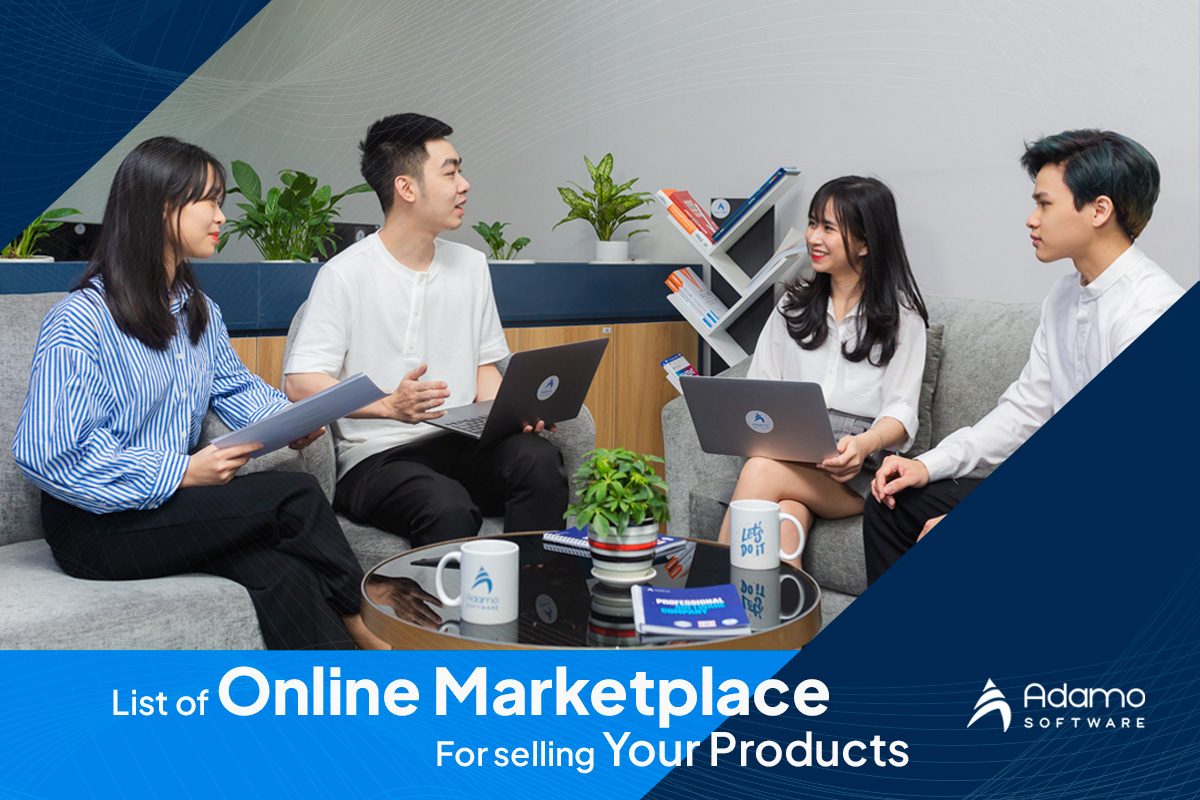CRM for retail: complete guide to explore retail crm software
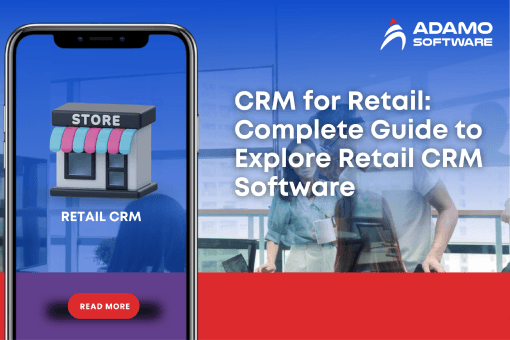
Let’s explore how CRM for retail software can manage customer interactions, personalize experiences, and ultimately drive sales growth for firms.
Building strong customer relationships is crucial for success in today’s competitive retail landscape. This is where CRM for retail software comes in, offering a powerful toolkit to manage customer interactions, personalize experiences, and ultimately drive sales growth.
Wouldn’t it be great if you are able to remember your customers’ past purchases and recommend relevant products they’ll love or you can offer special promotions and loyalty rewards based on their unique preferences and provide your customers seamless support across all channels, online, in-store, and on social media?
That’s the transformative power of CRM for Retail. With the right tools in your arsenal, you can cultivate deeper connections, drive loyalty, and ultimately watch your sales and revenue soar. This comprehensive guide will unpack everything you need to know about CRM for retail, from understanding its core functionalities to choosing the perfect solution and CRM for retail software for your unique business. So, buckle up and get ready to unlock the full potential of customer relationships in the digital age!
I. What is Retail CRM?
Retail CRM (Customer Relationship Management) software is designed specifically for the retail industry to manage their leads and customer segments and is called a retail CRM solution. Retailers’ CRMs will have information and capabilities such as buyer product preferences and customer profiles with contact information.
A CRM for retail, on the other hand, helps businesses optimize the relationship with customers by understanding and engaging customers with personalized offers. Retail CRM also plays a crucial role in driving customer loyalty, and long-term business growth.
II. Explore Benefits of CRM for Retail:
– Boost Customer Satisfaction: Personalized outreach, purchase history insights, and efficient support lead to happier customers.
– Increase Sales & Revenue: Targeted campaigns, loyalty programs, and upselling opportunities drive higher sales and conversions.
– Improve Operational Efficiency: Automated tasks, sales pipeline management, and inventory tracking enhance overall efficiency.
– Gain Valuable Insights: Data-driven reports and analytics provide actionable insights into customer behavior and market trends.
Beyond the basics, let’s explore the specific benefits CRM brings to different areas of your retail business:
1. Customer Satisfaction:
– Personalized communication: Leverage purchase history and preferences to send targeted emails, birthday greetings, and relevant product recommendations.
– Proactive customer service: Identify at-risk customers and address their concerns before they escalate, reducing churn and promoting loyalty.
– Omnichannel support: Offer seamless support across online, in-store, and social media channels, ensuring a consistent and positive experience.
2. Increased Sales & Revenue:
– Targeted marketing campaigns: Segment your customer base and deliver personalized offers and promotions through email, SMS, or social media.
– Upselling and cross-selling opportunities: Identify complementary products based on purchase history and recommend them during interactions.
– Loyalty programs: Implement reward programs to incentivize repeat purchases and build long-term customer relationships.
– Improved sales pipeline management: Track leads, nurture them through the sales funnel, and convert them into paying customers.
3. Improved Operational Efficiency:
– Automated tasks: Free up your team’s time by automating repetitive tasks like sending follow-up emails or generating reports.
– Streamlined processes: Improve order processing, inventory management, and customer service through automation and centralized data.
– Enhanced collaboration: Break down silos between departments and ensure everyone has access to relevant customer information.
4. Gain Valuable Insights:
– Data-driven decision-making: Analyze customer behavior, purchase patterns, and campaign performance to gain actionable insights.
– Identify sales trends: Predict future demand and optimize inventory levels to avoid stockouts or overstocking.
– Measure ROI: Track the return on investment of your marketing campaigns and CRM implementation.
5. Additional Benefits:
– Compliance and data security: Ensure data privacy compliance and secure customer information with robust security features.
– Scalability: Choose a CRM that can grow with your business and adapt to your changing needs.
– Mobile accessibility: Manage customer interactions and access data on the go with mobile CRM apps.
III. 7 Key Features of Retail CRM Software:
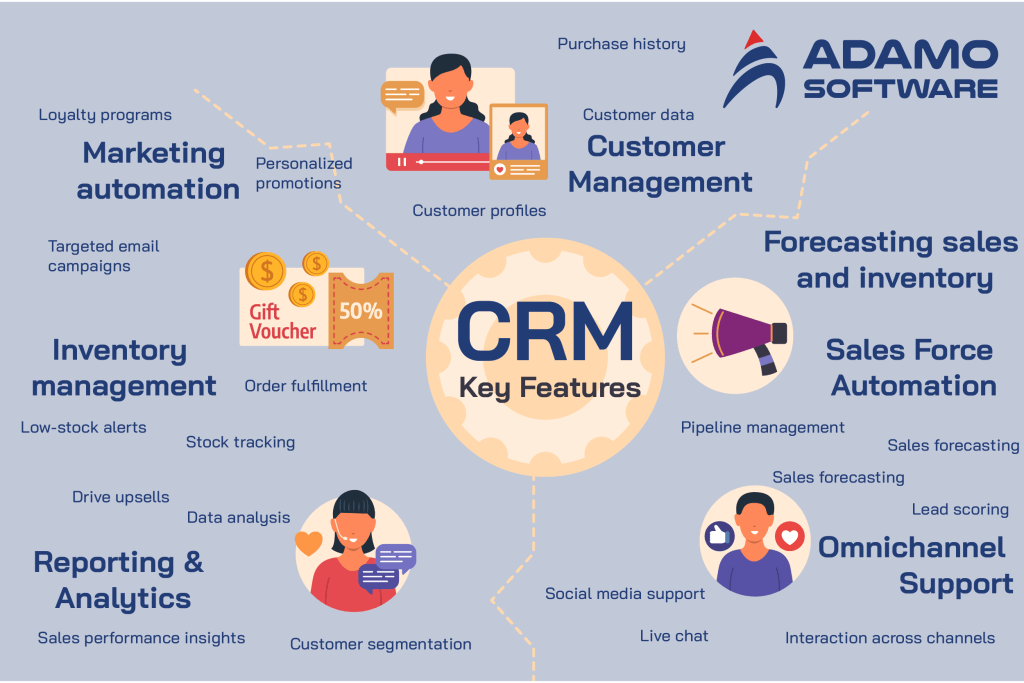
1. Customer Management in CRM for retail
Centralized customer data
Store all your customer information in one place, including contact details, purchase history, preferences, and communication history. This provides a 360-degree view of your customers and helps you personalize your interactions with them.
Customer profiles
Create detailed profiles for each customer, including their demographics, interests, and buying habits. Businesses can use this information to segment their customer base and effectively target their marketing campaigns..
Purchase history
Track your customers’ purchase history to see what they’ve bought in the past and recommend similar or complementary products. This can help you increase sales and improve customer satisfaction.
2. Marketing Automation in CRM for retail
Targeted email campaigns
Send targeted email campaigns to specific segments of your customer base based on their interests and purchase history. This is a more effective way to reach your customers and convert them into leads or sales.
Personalized promotions
Offer personalized promotions and discounts to individual customers based on their preferences. This is a great way to increase customer engagement and loyalty.
Loyalty programs
Implement a loyalty program to reward customers and incentivize them to return. This can help you build long-term customer relationships and boost sales.
3. Sales Force Automation in CRM for retail
Pipeline management
Track your sales pipeline from lead generation to conversion. This helps you identify potential problems and close deals more efficiently. CRM software pipeline management
Lead scoring
Score your leads based on their likelihood to convert into paying customers. This helps you focus your sales efforts on the most promising leads.
Sales forecasting
Forecast your future sales based on historical data and current trends. This helps you make better decisions about inventory, staffing, and marketing.
4. Omnichannel Support
Seamless interaction across channels
Provide your customers a seamless experience across all channels, including online, in-store, and social media. Customers can start an interaction on one channel and pick it up on another without repeating themselves.
Live chat
Offer live chat support on your website so that customers can get help in real time. This is a great way to resolve issues quickly and improve customer satisfaction.
Social media support
Monitor your channels for customer inquiries and respond to them promptly. This shows your customers that you care about their feedback and are committed to providing a positive experience.
5. Inventory Management
Stock tracking
Track your inventory levels in real-time to avoid stockouts. This helps ensure you always have the products your customers want in stock.
Order fulfillment
Streamline your order fulfillment process to get products to your customers quickly and efficiently. This can help you improve customer satisfaction and reduce costs.
Low-stock alerts
Set up low-stock alerts to be notified when inventory levels are running low. This helps you avoid stockouts and can also be used to trigger automatic reorders.
6. Reporting & Analytics
Comprehensive data analysis
Generate reports on your sales, marketing, and customer service performance. This data can be used to identify trends, track progress, and make informed decisions about your business.
Sales performance insights
Gain insights into your sales performance, such as which products are selling well, which sales reps are performing the best, and what marketing campaigns are driving the most sales.
Customer segmentation
Segment your customer base based on demographics, interests, and purchase history. This can be used to target your marketing campaigns more effectively and personalize your interactions with your customers.
7. Forecasting sales and inventory
CRM for retail can be used by businesses to forecast inventory levels and sales. For instance, the system can project sales for the upcoming quarter based on historical sales trends. It may also indicate the amount of inventory required based on existing inventory levels and sales estimates. This prevents stockouts and overstocking by ensuring businesses always have an adequate supply of inventory.
IV. How to Find the Right Retail Store Management Software Development Company:
– Industry Expertise: Choose a company with experience in developing retail-specific CRM solutions.
– Technology Stack: Ensure they use modern technologies and adapt to evolving industry trends.
– Customization Options: Consider the flexibility to tailor the solution to your specific needs and budget.
– Security & Scalability: Prioritize data security and the ability to scale with your business growth.
– Positive Client Testimonials: Research and verify their track record of successful CRM implementations.
V. 10 Best CRM for Retail Stores in the Market:
1. Salesforce Commerce Cloud
2. Zoho CRM Plus
3. HubSpot CRM
4. Microsoft Dynamics 365 Customer Engagement
5. Oracle CX Retail
6. SAP Customer Experience
7. Shopify Plus
8. NetSuite SuiteCommerce
9. Magento Commerce
10.Lightspeed Retail
Top 10 CRM Solutions for Retail Stores in 2024
Choosing the right CRM for your retail store can be overwhelming, with so many options available. Here’s a closer look at 10 of the most popular CRM solutions specifically designed for the retail industry, along with their key features and benefits:
1. Salesforce Commerce Cloud:
– Industry leader: A comprehensive and powerful CRM platform offering omnichannel marketing, sales, and service functionalities.
– Scalability: Adapts to businesses of all sizes, from small retailers to large enterprises.
– AI-powered insights: Leverages AI to gain deep customer understanding and personalize experiences.
– Price: A custom quote is required and can be expensive for smaller businesses.
2. Zoho CRM Plus:
– Cost-effective: Affordable option with a free plan and paid tiers for growing businesses.
– Wide range of features: Includes sales, marketing, customer service, inventory management, and reporting tools.
– Customization: Highly customizable to fit your specific needs and workflows.
– Limited omnichannel support: Basic omnichannel capabilities compared to some competitors.
3. HubSpot CRM:
– Free forever plan: Ideal for small businesses starting out with basic CRM needs.
– Ease of use: User-friendly interface and intuitive design for non-technical users.
– Marketing automation: Built-in marketing automation tools for email campaigns, lead nurturing, and landing pages.
– Limited reporting: The free plan lacks advanced reporting and analytics features.
4. Microsoft Dynamics 365 Customer Engagement:
– Integration with Microsoft ecosystem: Seamless integration with other Microsoft products like Office 365.
– Advanced analytics: Powerful reporting and analytics capabilities for in-depth data insights.
– Scalability and security: Scalability is important for large enterprises and adheres to strict security standards.
– Complex interface: This can be overwhelming for users unfamiliar with Microsoft products.
5. Oracle CX Retail
– Enterprise-grade solution: Tailored for large retail chains with complex needs and operations.
– AI-driven personalization: Leverages AI to personalize marketing campaigns and product recommendations.
– Omnichannel capabilities: Robust omnichannel support across various touchpoints.
– High implementation cost: Significant investment is required for setup and ongoing maintenance.
6. SAP Customer Experience:
– Integration with SAP ERP: Seamless integration with SAP ERP systems for unified data management.
– Global reach: Supports multinational businesses with operations worldwide.
– Scalability and security: Highly scalable and secure platform for large enterprises.
– Steep learning curve: Complex interfaces and functionalities might require extensive training.
7. Shopify Plus:
– E-commerce focus: Specifically designed for Shopify Plus e-commerce businesses.
– Seamless integration with Shopify: Integrates seamlessly with the Shopify platform and apps.
– Omnichannel marketing: Supports omnichannel marketing campaigns across various channels.
– Limited customer service features: Lacks some advanced customer service functionalities.
8. NetSuite SuiteCommerce
– Cloud-based platform: Scalable and flexible cloud-based solution for omnichannel commerce.
– Inventory management: Robust inventory management features with real-time stock tracking.
– Order management: Streamlined order management process from fulfillment to returns.
– Pricey for small businesses: It can be expensive for smaller retail stores.
9. Magento Commerce:
– Open-source platform: Highly customizable open-source platform for developers and tech-savvy retailers.
– Flexibility: Offers extensive customization options to tailor the platform to your specific needs.
– Large community: Benefits from a large and active developer community for support and resources.
– Requires technical expertise: Setting up and managing the platform requires technical knowledge.
VI. Importance of CRM for retail in Inventory Management to Boost Supply Chain Efficiency:
CRM integrates with inventory management systems, providing real-time stock visibility, predicting demand, and optimizing ordering processes.
1. Real-time inventory visibility of CRM for retail
CRM for retail in inventory management systems provide real-time visibility into inventory levels, which allows businesses to monitor stock quantities and locations accurately. Thanks to this, companies can make informed decisions about inventory replenishment, avoid overstock situations.
2. Planning tools in the CRM for retail
Retail CRM uses historical sales data to forecast future demand. With this feature, businesses can anticipate customer needs and adjust inventory levels accordingly. This helps optimize supply chain management, reducing costs and improving overall efficiency. Retail CRM uses historical sales data to forecast future demand
3. Process optimization CRM for retail
CRM in inventory management can automate many operations related to inventory management, such as sending automatic emails to customers when their orders ship, generating invoices, and tracking payments. As a result, businesses can save time, and reduce costs in supply chain operations .
4. Multi-channel inventory management
Retail CRM software also streamlines various processes across multiple channels, allowing businesses to effectively manage inventory across different sales channels, such as online stores, physical stores, and distribution centers
VII. Why Choose Adamo as a Trusted Tech Partner to Build CRM Software for Retail Industry:
Adamo is a leading software development company with extensive experience in crafting custom CRM solutions for the retail industry. We offer:
– Agile Development: Collaborative approach ensuring your specific needs are met.
– Proven Expertise: Skilled developers with in-depth retail CRM knowledge.
– Competitive Pricing: Cost-effective solutions tailored to your budget.
– Long-Term Support: Ongoing maintenance and updates for your CRM system.
FAQs with CRM for Retail:
1. Why is CRM for retail industry important?
CRM helps retailers build stronger customer relationships, personalize experiences, and drive sales growth, ultimately leading to success in the competitive retail landscape.
2. What is a retail CRM system?
It’s software designed specifically for retail businesses, centralizing customer data, automating tasks, and streamlining processes to gain valuable insights and personalize customer interactions.
3. How to select the right IT vendor to build CRM for retail software?
Consider their industry expertise, technology stack, customization options, security measures, scalability, and client testimonials.
4. What are digital trends in the retail industry?
Omnichannel experiences, personalization, AI-powered recommendations, and mobile shopping are key trends shaping retail’s future.
By implementing a robust CRM system, retailers can gain a competitive edge, transform customer experiences, and thrive in the ever-evolving retail landscape. Let Adamo be your trusted partner in building the perfect CRM solution for your retail business.




